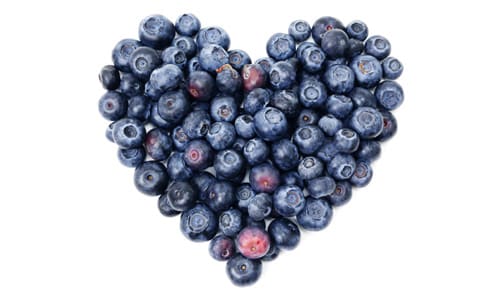
When it comes to blueberries, I consider them one of nature’s true jewels. These beautiful berries are a delight to the eyes, delicious, and have healing powers that make them one of nature’s top “super foods”. And, if you haven’t kept up with the latest information on blueberries, you may be missing out on one of the tastiest medicinals on the planet.
America is currently suffering from malnutrition. Too many of our routine foods have plenty of calories but very few nutrients. Sodas, candies, chips, and pasta are a few classic examples. These “foods” have plenty of calories, but when it comes to things like vitamins, minerals, fiber, and phytonutrients (plant-based nutrients), they are lacking to say the least. But when it comes to blueberries, think opposites! Let me explain…
Blueberries are a powerful antioxidant, and are rich in nutrients like vitamins C and K. They are also low in calories. These traits are just the opposite of most American foods. The rich blue color comes from a natural pigment known as an anthocyanin, a type of flavonoid phytonutrient that enhances health on multiple levels. You should consider blueberries as a daily food routine to achieve the following health benefits:
1. Blueberries inhibit weight gain.
Weight gain is out of control in America. Some researchers are now focusing on how to stop weight gain as opposed to how to lose weight. They seem to have given up on weight loss! Although weight loss and maintenance is very achievable, it does require some powerful strategies. One of those strategies, especially for maintaining weight loss, may be blueberries. Not only are blueberries low in calories and a good source of fiber (70 calories and 4 grams of fiber in a cup), the flavonoids change the way our bodies process and store calories.
Research presented in 2011 showed that blueberry flavonoids inhibit fat cells from storing fat. In fact, a 74% reduction in the ability of fat cells to store fat was achieved.
A study in mice on a high fat diet found that they all gained fat UNLESS blueberry juice was also given. Those mice had no body fat change compared to those on a low fat diet. Other research on rats showed that blueberries reduced abdominal fat. (Note: More research on humans is needed.)
2. Blueberries help keep blood vessels healthy.
We are currently in the midst of an epidemic of blood vessel disease. In fact, heart attacks, strokes, and high blood pressure can all be blamed on blood vessel disease. Poor nutrition, unwanted weight gain, stress, sleep deficiency, poor air quality, and inactivity are just a few of the factors that lead to blood vessel disease.
Once blood vessels become unhealthy, their ability to flex and dilate becomes limited. These damaged blood vessels become more like metal pipes than the dynamic, stretchable, bendable, living transport systems they were designed to be. Every molecule of oxygen and every nutrient is delivered to your vital organs by your amazing network of blood vessels. Once damaged, one’s health potential is limited.
Fortunately, blood vessels have an amazing ability to heal if cared for properly. Blueberries can be part of the solution. Blueberry flavonoids have been shown to:
- Decrease blood pressure by relaxing blood vessels.
- Increase blood vessel dilation after ½ to 1 cup of blueberries.
- Improve blood vessel function within just 1-2 hours.
3. Blueberries protect the brain from age-related disease.
Parkinson’s disease is a disease no one wants. The gradual, progressive deterioration of important cells in the midbrain can lead to difficulty with walking, as well as depression, and dementia. A study of 49,281 men showed that those with the highest intake of total flavonoids (from foods like blueberries) had a 40% lower risk of Parkinson’s Disease. Those consuming the most berries lowered their risk by 23%.
Aging has a negative effect on brain function, including memory. Memory loss has been considered by many to be inevitable as we age. However, blueberries were found to slow the typical age-related decline in brain function. Those consuming the most blueberries delayed brain aging up to 2 ½ years.
4. Blueberries protect the heart.
Blueberries have been shown to not only lower blood pressure, but also to decrease the risk from cholesterol. LDL, or “bad” cholesterol, increases the risk for heart attack when it becomes “oxidized”. Blueberries reduce oxidation of LDL cholesterol, lowering heart attack risk.
5. Blueberries fight diabetes.
Blueberries lower the risk of diabetes. And any help we can get is welcome. 1 in 5 adults are expected to have diabetes in the next 35 years. Many already have “pre-diabetes” and are headed down a road to this deadly disease.
Some of the first research on blueberries fighting diabetes was published in 1927! Weight gain prevention, less insulin resistance, and slowing the digestion of carbohydrates are just a few of the ways that blueberries help fight diabetes.
Conclusion: Blueberries can be a powerful health-promoting daily food.
I recommend berries as a food routine, preferably daily, for most people. Although temporary food restrictions to achieve weight loss may be necessary, blueberries can be a great component of a long-term daily nutrition routine.
Research indicates that ½ to 1 cup is enough to deliver health benefits. Unless restrictions are needed, up to 1 cup daily is a typical recommendation. Blueberries should be purchased fresh or frozen. They may be eaten as a snack, added to smoothies or yogurt, or included in dessert recipes.
Nutrient-rich foods are essential for Optimum Health. Embrace blueberries and other healthy foods on your journey to Optimum Health.
For Optimum Health,
Rick Tague, M.D., M.P.H.

